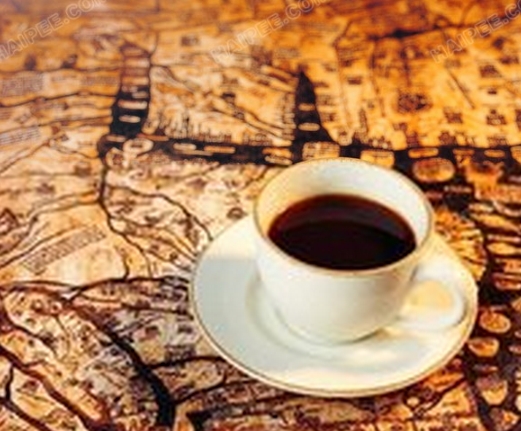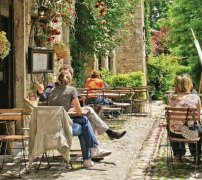The second part of the history of coffee-coffee spread to Europe

Pope VIII: Clement
It was not until 1615 that coffee officially entered Europe. The merchants of Venice had close trade ties with the Levant (the historical term refers to a large area of the Middle East that included Israel, Jordan, Lebanon and Syria) and began to import coffee into Italy. As soon as we came to Europe, the consumption of coffee rose rapidly. However, the introduction of coffee into Europe is not without controversy. According to many rumors, a group of Christian clergy banned its widespread use. They came before Pope Clay Mente (1535-1605) and claimed that coffee was a follower of Satan, while Christians who drank it might lose their souls and be controlled by the devil. Pope Clement said he insisted on tasting coffee before banning it. After the first cup, the pope was impressed by the coffee. He said such a drink could not be a believer in Satan, and coffee has since become a true Christian drink.
The first person to make brewing coffee in history was an international student named Conopios from Crete, England, who studied at Balliol College, Oxford University. This happened in May 1637. Although Conopios was expelled from the university soon after, he had a great influence on Oxford because it was the first English cafe at Oxford University that opened in 1650. Although he moved to London and repeated his success a few years later, he has begun to see the trend of more cafes opening in Oxford during the decade.
There is an organization in the cafe called the Oxford Coffee Club. The organization consists of prominent scientists from the University of Oxford, including Mr. Robert Boyle, and their students, who meet to discuss their theoretical research and exchange ideas. The British "Oxford Coffee Club" evolved from the world-famous Royal Society, one of the world's leading scientific groups.
Lloyd of London
As the world's largest insurance company, London's Lloyd, 's Bell Tower Street Cafe in 1688 was opened by Edward Lloyd, whose main customers were seafarers and businessmen.
It is rumored that the habit of tipping originated in British cafes. There is often a small box here, and there is a small box hanging near the counter of the cafe. Guests will put a dollar in it to encourage the waiter to do better service.
The early development of cafes is mainly due to the support of doctors, because coffee has the ability to promote wound healing. Before the introduction of cafes, there was a common problem. Beer was so drunk in public places that it drank a lot of alcohol at almost every meal. But as coffee's health benefits are widely accepted and coffee is cheaper than beer, cafes are starting to replace taverns as the preferred meeting place. Of course, the business of taverns has been hit like never before, and it is the owners of these taverns who are most opposed to coffee. They claim that coffee is an Arabic drink that is not suitable for polite male Christians, unlike beer that has been brewed for centuries.
Tavern owners are not the only group to attack coffee. Because women are upset, their people spend more time in cafes, and then their families start to protest against coffee on . In 1674, in the publication of the harm of Coffee to Women, women protested that coffee reduced men's sperm count and led to a decline in libido. But in fact, this is all nonsense, women should be grateful for coffee, because it is actually an aphrodisiac.
Important Notice :
前街咖啡 FrontStreet Coffee has moved to new addredd:
FrontStreet Coffee Address: 315,Donghua East Road,GuangZhou
Tel:020 38364473
- Prev

How to enjoy a leisurely coffee time
Sitting in a coffee shop is like taking a train, shaking and shaking, that kind of steady rhythm, people will be dazed, it will be easy to fall asleep, there will be a lot of images emerge. This is the feeling given by the Taiwanese movie Coffee time. The story is very simple, the love story between the secondhand bookstore owner and the girl has a long scene description. The men and women sleeping in the tram and the silence in the cafe
- Next

A cup of coffee, a time, a love
A cup of coffee, a time, a first taste of love, enjoy the sweetness and softness of fresh milk foam; then, feel the bitterness and richness of the original coffee beans; carefully aftertaste, appreciate the mellow and meaningful coffee. Along the taste of coffee, I embarked on the journey of love. A large number of milk bubbles remind people of their first love, smooth and sweet, with irresistible unique charm.
Related
- How did the Salvadoran coffee industry develop in Central America?
- What exactly does the golden cup extraction of coffee mean?
- The Origin of Coffee flower
- [2023 Starbucks World Earth Day] there are more meaningful things besides free Starbucks coffee!
- What kind of coffee is there in Spain? 9 Flavors of Spanish Coffee
- Aromatic African coffee| Kenya's coffee culture and historical production area
- Liberica Coffee Bean knowledge: the characteristics of Liberian Coffee beans of the three original species of Coffee beans
- The origin and formula of Spanish latte introduces the taste characteristics of Bombon coffee in Valencia, Spain.
- How to adjust the solution of over-extracted coffee
- What is the tasting period of coffee beans? What is the period of coffee and beans? How should coffee wake up and raise beans?

